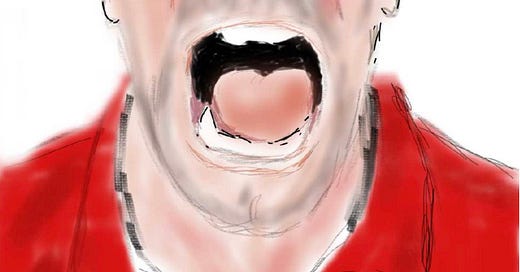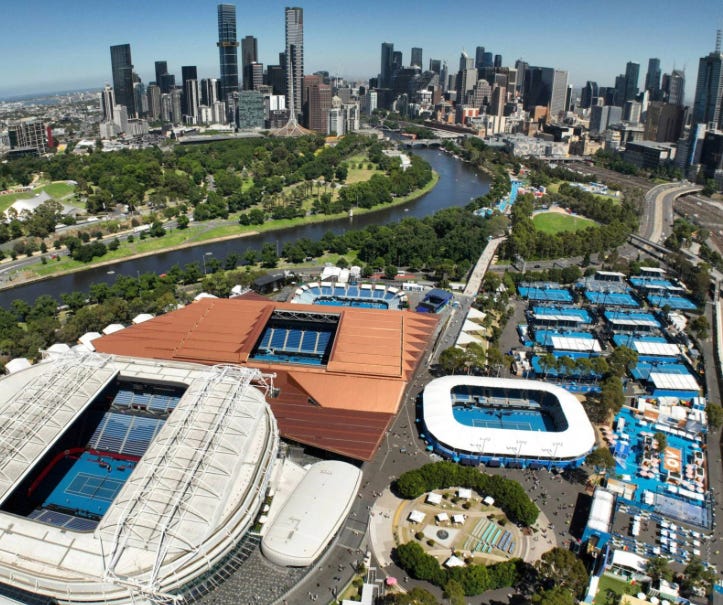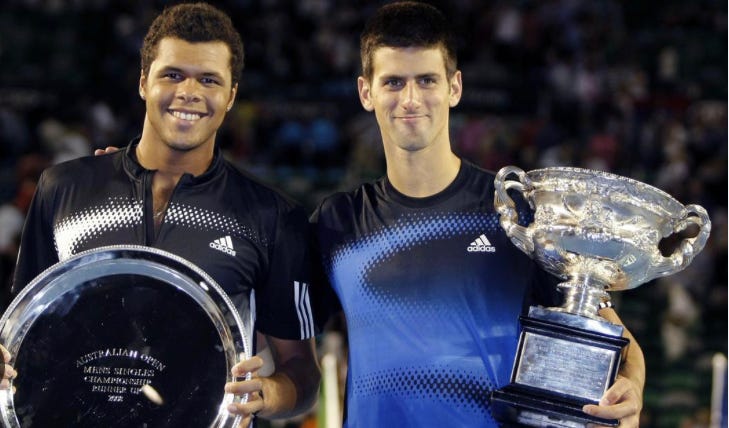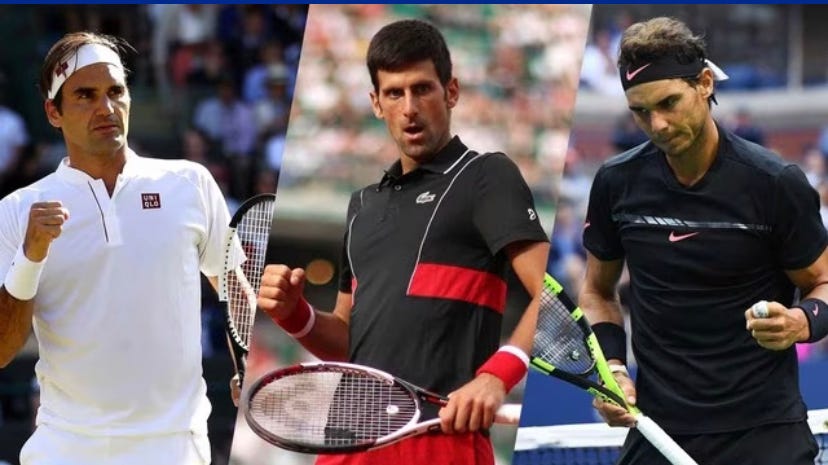21st Century Greats: Novak Djokovic
Is the Serb, who has won the most individual majors, the greatest of all time?
Over the course of the year, I will be posting biographies of 25 modern sporting greats to celebrate being a quarter way through the 21st Century. As usual, these posts will combine a summary of some of their sporting achievements mixed with my own memories of watching them. There is no order to the list, just a celebration of fantastic sportspeople.
21st Century Greats: Novak Djokovic
The Australian summer of 2007 into 2008 was a brilliant one for me, particularly in terms of viewing sporting events. I wrote last week of going to the MCG for a couple of days to watch the Aussies take on India in the Boxing Day Test, but even more satisfying were my visits to go and watch the Australian Open tennis tournament.
Melbourne is an absolute haven for sports (as well as music, food and many other things) which is one of the main reasons that I had decided to make that a place that I would be staying for a sustained period of time on my travels. Between football, rugby, tennis, cricket and Aussie rules there is something that you could go and watch virtually every weekend if you wanted to.
I had planned ahead and purchased ground tickets for the entire first week of the Australian Open, giving me access to all of the courts apart from the Rod Laver Arena and the (then) Vodafone Arena. I knew that as there were so many players in the tournament at the beginning then there would be a great chance of getting to watch some high seeds in action and this turned out to be the case.
A glorious week was spent in the sunshine watching the likes of the Williams sisters, David Ferrer, Jelena Jankovic, David Nalbandian and Jo-Wilfried Tsonga. The unseeded Frenchman was the undoubted star of the tournament and after beating Andy Murray (much to my chagrin) in the first round, he went on a tear all the way to the final, the standout performance being a straight sets victory over Rafael Nadal in the semis.
Another crowd favourite was the Serbian 3rd seed Novak Djokovic. Still only 20 at the time, Djokovic had been performing ever more consistently over the previous couple of years and had reached the semi-finals of both the French Open and Wimbledon and the final of the US Open the previous year. The Serb powered his way through the rounds here, getting to the final without dropping a set, including a third round victory over Sam Querry which I had managed to get in to see, and, even more impressively, a semi-final win over Roger Federer which stopped the Swiss from getting to his 11th consecutive major final.
For the final, some friends and I gathered down at Federation Square in central Melbourne to watch with the masses. There was a real party atmosphere as the sun began to come down on a beautiful summer evening. I must say that, as usual, I was supporting the underdog Tsonga on that evening but I liked Djokovic too so wasn’t overly bothered who won. Mixed allegiances seemed to be common throughout the crowd.
Much to my delight, Tsonga took the first set but Djokovic, as he would go on to do so many times, upped the ante and began to dominate proceedings. He won sets 2 and 3 fairly routinely and by the time of the tie break in the fourth, there was no real doubt over who would win. Djokovic took the tie break 7-2 to the roars of the crowd and won his first major tournament.
Since that victory in 2008, Djokovic has gone on to win 9 more Australian Open titles, his total of 10 being the most ever won. Melbourne must surely feel like a home from home for him and more often than not it has proved a location that has started his year off on the right foot. It didn’t all come straight away though with the continued dominance of Federer and Nadal meaning that he actually didn’t win another major title until he was back in Australia in 2011 although he did also go on the then win Wimbledon and the US Open in the same year.
At the time of writing, Djokovic has gone to win 24 major tournaments in his career which is the most of anyone ever. Over the latter end of 2015 and the beginning of 2016, he also became the only man in history to hold all of the four major titles across the three different current surfaces (Rod Laver had previously done it over two) at one time which is truly an outstanding achievement.
He hasn’t stopped at just the major tournaments either, having won all of the different Masters events, won the end of year championships (7 times), and in 2024 in Paris completed the Career Super Slam by finally winning the Olympic Gold Medal. On top of this, he also led his nation Serbia to win the Davis Cup team competition in 2010 to show that he can be a leader as well as an individual.
Djokovic’s voice is also an important one on tour and he served as the President for the tour Players’ Council for a number of years which would have entailed leading meetings and making recommendations to tour directors and management. He is clearly highly thought of and respected amongst his fellow players and has been a key part of driving the sport forwards.
There is no question in my mind that had Djokovic achieved what he has in any other generation then he would easily be named the greatest player to have ever lived but the debate will always rage on due to the phenomenal achievements of two other incredible players, Roger Federer and Rafael Nadal (and to a certain extent, Andy Murray as well). Yes, Djokovic may have eclipsed them in many respects in terms of records, but the title of overall best can still easily be questioned. Perhaps what it may be fair to say is that Nadal was the best on clay, Federer the best on grass, but Djokovic the best all-rounder.
What is fact is that in all-time meetings, Djokovic had a winning record over both Federer (27-23) and Nadal (31-29). He is also the only man in history to have beaten Nadal at all four majors. He also had a superior record against Federer in major tournaments (11-6), including defeating the Swiss 4 times in major finals. It could possibly be argued that Federer’s peak came before Djokovic’s though so therefore his best was over before the Serb was dominating.
In terms of domination, Djokovic’s two best overall seasons (2011 and 2015) show just how consistent his play could be when he was in form. In 2011, he won 10 tournaments including 3 majors and finished up with a brilliant 70-6 overall record. Only losing six matches in an entire season considering the quality of opposition that he regularly faced seems quite ridiculous.
However, Djokovic managed to top even this in 2015 where he won 3 majors again and this time won 11 tournaments in total. Over the course of the year, he reached the final of 15 consecutive tournaments, including all of the big ones that he played in. Insane statistics for anyone, even Djokovic. 2015 also served as the starting point for the ‘Nole Slam’ where he went on to win in Australia and France in 2016 to hold all four majors at once.
Although Djokovic is not now as dominant as he once was and a new generation is emerging, he is not done yet so it is impossible to say exactly what his final statistics will be. What can be said for certain is that the numbers that he has posted already will be incredibly difficult for anyone in the future to beat and his position as an all-time great, perhaps the very best of all, will stand into eternity.
Notable Achievements:
24 Grand Slam singles titles - Record
10 Australian Open titles - Record
Olympic Champion
7 Year End Players Championships
Triple Career Grand Slam - Record
428 weeks as World No.1 - Record
World No.1 in 13 different years - Record
Davis Cup winner








